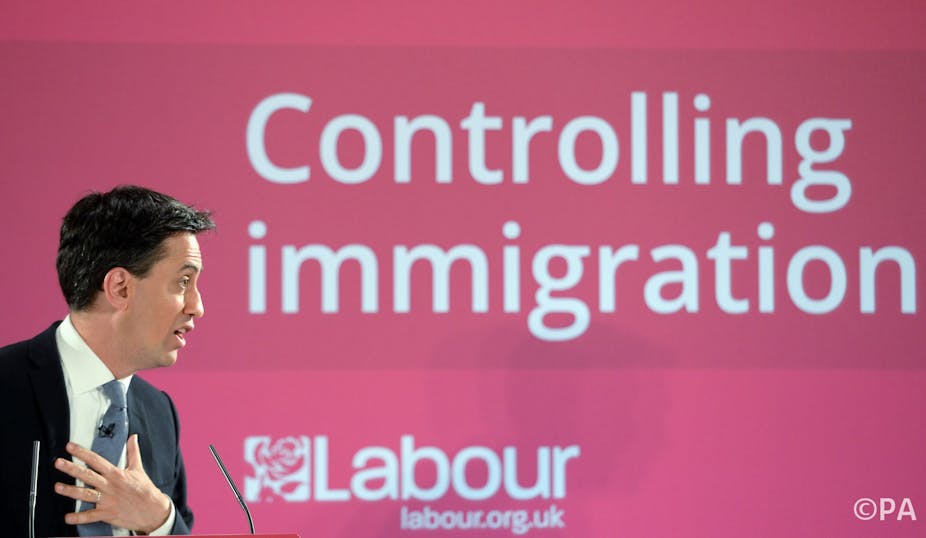Ed Miliband has admitted that Labour is “on a journey” when it comes to immigration. He has promised that his party “will never again turn our backs on people who are worried about immigration” but also that it won’t forget about “the rest of the world”.
If you’re confused about what this actually means, you’re not alone.
In his first big political vision as head of the Labour party, the son of a prominent refugee from Nazism has chosen to invoke the old Tory slogan of “one nation”. It’s an idea embraced by the far right all over the world, especially in Australia’s infamous anti-refugee party One Nation.
In doing so, Miliband has tacked behind the Tories. They have talked tough on immigration by setting up a “hostile environment working committee” and commissioning billboards telling irregular migrants to go home, but have followed up with unworkable policies which they can gracefully abandon – for example by gouging students out of the figures to make net migration look lower.
Questions of right and wrong aside, the Tory strategy is politically very clever indeed. An indignant, nationalistic tone on immigration will appeal to economic and cultural conservatives across the political spectrum, while a softer regulatory follow-through will keep economic liberals happy, maintaining the immigration needed to keep large businesses profitable.
The Conservatives are just following the textbook, balancing conflicting demands from pro and anti-immigration constituencies. For many people, their policy failures will look heroic rather than planned.
The road not taken
Labour could have just done the exact opposite. They could have talked “open” on immigration, defending human rights and cultural diversity to appeal to the economically and culturally liberal elites of both main parties. They could simultaneously have dog-whistled to economically and culturally conservative working Britons, their traditional support base, with quiet but firm promises of labour-market protections and integration measures.
That would have helped assuage fears of cultural “swamping” or wage competition between native and immigrant workers. It could have staked out a strong leftish stance on immigration, while balancing conflicting demands just as the Conservatives have done. But Labour chose not to play that game.
Instead, apparently spooked by the moral panic over immigration, at a moment when intra-party consensus-building should have been top priority, Labour tried to look empathetic and contrite by apologising for its record on immigration.
At the bottom of that slippery slope now stands Ed Miliband, a refugee’s son summoning up the spirits of Benjamin Disraeli and Pauline Hanson. When Miliband says the party is on a journey over immigration, it sounds like he doesn’t know where to turn next.
Apologia
Allowing this to happen was a major strategic error.
Notwithstanding failures to predict rising immigration on its watch, and Gordon Brown’s disastrous “bigoted woman” gaffe, the Labour party is not solely to blame for the effects of the multiculturalism that makes many Britons feel like strangers in their own land.
This came about just as much because post-war Conservatives wanted to keep the British Empire open for business, and the momentum of those decisions persists in family reunification migration.
It’s not entirely clear why Miliband has apologised for a complex history that’s certainly not just Labour’s legacy – and which is not a problem for much of the electorate. For every “closed” voter they gain by this strategy, they lose an “open” one.
Disenchantment
Labour’s immigration fumble also stems from a basic misinterpretation of the UKIP phenomenon. UKIP is successful not just because it picked up the BNP’s xenophobic supporters, but because it picked up people angry with both main parties for the economic crisis.
Before 2010, the Liberal Democrats took a chunk of this constituency – but now voters are furious with them for teaming up with the Conservatives. Voters punished the Lib Dems in the European elections earlier this year not over immigration or the EU, but because the party sacrificed core policies for coalition power.
Had they been accustomed to coalition politics, they would just have signed a “supply and confidence” agreement, guaranteeing the UK a stable government while maintaining their own independence from the Conservatives. No doubt they now realise this was more precious than the cabinet seats their loyalty bought.

Perhaps Labour and the Liberal Democrats can help each other. Nick Clegg needs distance from the Conservatives: he gets some of that by taking a strong pro-European stance and defusing immigration from a moral panic into a technical failure of management. But as long as he is locked in coalition, it is very hard to shake free. Courting Labour may offer his party a lifeline.
Meanwhile, Miliband may need the Liberal Democrats more than he thinks – not just to counter a likely Conservative-UKIP alliance, but for simple moral support. The longer Labour apes the Conservatives and UKIP on immigration, the longer it sounds ideologically confused and insipid.
Even Clegg has called Labour “regressive”. Working with the Liberal Democrats to define a progressive stance on immigration might be the only way left for Labour to get back through the looking glass on this issue.

